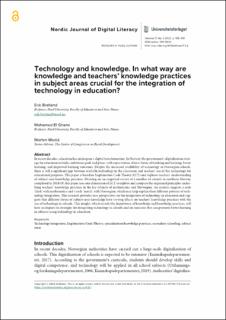| dc.contributor.author | Bratland, Erik | |
| dc.contributor.author | El Ghami, Mohamed | |
| dc.contributor.author | Mediå, Morten | |
| dc.date.accessioned | 2022-10-17T12:47:29Z | |
| dc.date.available | 2022-10-17T12:47:29Z | |
| dc.date.created | 2022-09-26T20:37:00Z | |
| dc.date.issued | 2022 | |
| dc.identifier.citation | Bratland, E., El Ghami, M. & Mediå, M. (2022). Technology and knowledge. In what way are knowledge and teachers’ knowledge practices in subject areas crucial for the integration of technology in education? Nordic Journal of Digital Literacy. 17(3), 155-169. doi: | en_US |
| dc.identifier.issn | 1891-943X | |
| dc.identifier.uri | https://hdl.handle.net/11250/3026429 | |
| dc.description.abstract | In recent decades, education has undergone a digital transformation. In Norway, the government’s digitalization strat-egy for education includes ambitious goals and plans, with expectations of new forms of teaching and learning, betterlearning, and improved learning outcomes. Despite the increased availability of technology in Norwegian schools,there is still a significant gap between available technology in the classroom and teachers’ use of this technology foreducational purposes. This paper is based on Legitimation Code Theory (LCT) and explores teachers’ understandingof subject-area knowledge practices. Drawing on an empirical survey of a number of schools in northern Norway,completed in 2018/19, this paper uses one dimension of LCT to explore and compare the organized principles under-lying teachers’ knowledge practices in the key subjects of mathematics and Norwegian. An analysis suggests a code‘clash’ with mathematics and a code ‘match’ with Norwegian, which may help explain their different patterns of tech-nology integration. This research provides new perspectives on the integration of technology in education and sug-gests that different forms of subject-area knowledge have varying effects on teachers’ knowledge practices with theuse of technology in schools. This insight, which reveals the importance of knowledge and knowledge practices, willhave an impact on strategies for integrating technology in schools and on measures that can promote better learningin subjects using technology in education, | en_US |
| dc.language.iso | eng | en_US |
| dc.rights | Navngivelse-Ikkekommersiell 4.0 Internasjonal | * |
| dc.rights.uri | http://creativecommons.org/licenses/by-nc/4.0/deed.no | * |
| dc.title | Technology and knowledge. In what way are knowledge and teachers’ knowledge practices in subject areas crucial for the integration of technology in education? | en_US |
| dc.title.alternative | Technology and knowledge. In what way are knowledge and teachers’ knowledge practices in subject areas crucial for the integration of technology in education? | en_US |
| dc.type | Peer reviewed | en_US |
| dc.type | Journal article | en_US |
| dc.description.version | publishedVersion | en_US |
| dc.rights.holder | © The Authors, 2022 | en_US |
| dc.subject.nsi | VDP::Samfunnsvitenskap: 200::Pedagogiske fag: 280::Allmennpedagogikk: 281 | en_US |
| dc.subject.nsi | VDP::Samfunnsvitenskap: 200::Statsvitenskap og organisasjonsteori: 240::Offentlig og privat administrasjon: 242 | en_US |
| dc.source.pagenumber | 155-169 | en_US |
| dc.source.volume | 17 | en_US |
| dc.source.journal | Nordic Journal of Digital Literacy | en_US |
| dc.source.issue | 3 | en_US |
| dc.identifier.doi | 10.18261/njdl.17.3.2 | |
| dc.identifier.cristin | 2055681 | |

